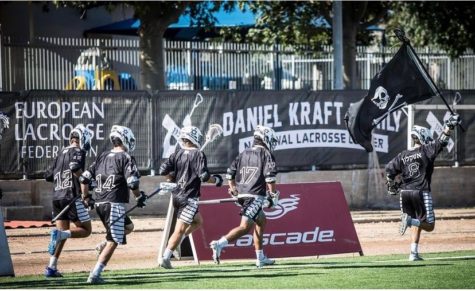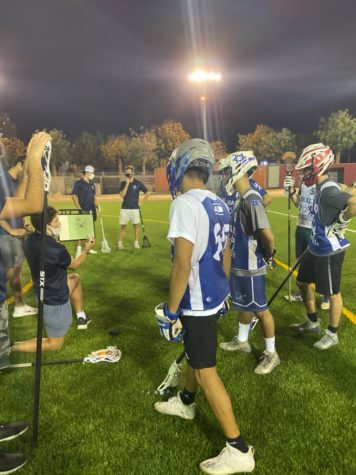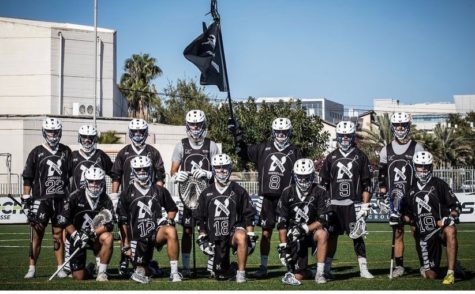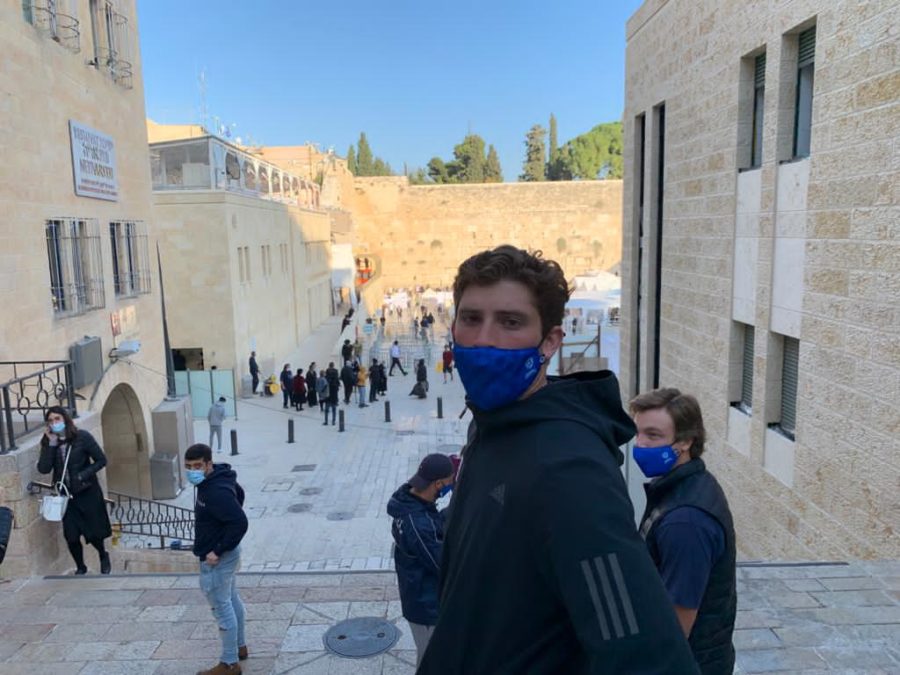Lacrosse on the other side of the world
How a trip to Israel changed Ryan Fitzpatrick’s perspective on lacrosse forever
May 4, 2021
It was late August when the Massachusetts men’s lacrosse team was back home awaiting its opportunity to return to campus. As the ongoing COVID-19 pandemic went on, select University of Massachusetts athletic teams were allowed to return to campus over the summer. The men’s lacrosse team was not one of those teams selected. Despite not being selected, the men’s lacrosse team remained optimistic about having the chance to play fall ball in the fall semester.
Sophomore Ryan Fitzpatrick was among many of the players eager to return to campus. After having his freshman campaign cut short due to the pandemic, he was looking forward to being back with the team and playing lacrosse again.
Fitzpatrick was coming off a solid start to his lacrosse career and saw playing time as a freshman. In the seven games the Minutemen played last year before their season was cut short, he forced five turnovers and picked up 14 ground balls.
Fitzpatrick’s strong performance in the short season earned him a spot as an honorable mention for the College Crosse All-Freshman Team. Not only did he perform well off the field, but Fitzpatrick was also named to the CAA Commissioner’s Academic Honor Roll. Fitzpatrick and the Minutemen were preparing for a Friday afternoon matchup with Utah before their season was put to an end.
In early August was when Fitzpatrick received an email from the head of operations of Israel Lacrosse. The email contained information about the gap year program they had and the unique opportunities it held. The type of program they hope their participants will never forget.

The goal of the program is to help spread the game of lacrosse by sharing knowledge with the youth players all across Israel. Players participate in local competitions and prepare and practice with their teammates. When the participants aren’t playing themselves, they’re developing the game in Israel by coaching the youth. The program takes place in the city of Ashkelon in Israel.
“I honestly had no connection whatsoever. I knew they existed. I also didn’t know that they even knew I existed” Fitzpatrick said. “Once I got that email around August, that was the first time I got connected with Israel Lacrosse.”
Fitzpatrick connected with Ian Kadish, the director of external relations at Israel Lacrosse to learn more about their gap year program and discuss the opportunity.
“I was very interested in the opportunity, but I was still going to be coming to UMass in the fall, we were still slated to practice” Fitzpatrick said. “I told him I like the opportunity, but I couldn’t do it because I was committed to playing at UMass, so I kind of put that on pause.”
After talking with Kadish, Fitzpatrick kept Israel Lacrosse in the back of his mind but turned his attention back to UMass. The Minutemen were preparing to practice in the fall, as it would have been the first time the team was together since the pandemic ended their previous season. However, the team fell victim to the pandemic again as their fall ball practices ended up being canceled. It was then when Fitzpatrick turned his attention back to Israel Lacrosse.
Fitzpatrick was heavily interested in participating in the gap year program but was a bit hesitant to fully commit. He wanted to make sure he had the approval of his coaches and teammates before he fully committed.
After talking with coaches, Fitzpatrick realized he had full support from them. He also had full support from his teammates.
“[Fitzpatrick] is another guy who is very steady, works hard every day in practice, is diligent in his conditioning and taking care of his body,” said head coach Greg Cannella. “[He] is consistent on the field each time out.”
“That was kind of what made me pull the trigger because I wanted to make sure that everyone would be alright with me doing it first off,” Fitzpatrick said.
Around mid-September was when Fitzpatrick committed to participate in the program and head to Israel. It was an opportunity that he didn’t want to miss out on.
“Take advantage of going abroad as a D1 athlete, cause that’s not something that we can really do cause we’re playing year-round,” Fitzpatrick said.
Fitzpatrick landed in Ashkelon, Israel and was forced to undergo a two-week quarantine upon his arrival. Israel is among one of the leading nations in COVID-19 vaccinations. The country was coming off a strict nationwide lockdown when Fitzpatrick arrived, however wearing masks was still required.
“Initially we were kind of thrown into the fire, I didn’t really know a majority of the people,” Fitzpatrick said.

The gap year program hosts participants from all over the U.S., as well as Canada. The program aims to provide a unique experience beyond the game of lacrosse. Participants are anticipated to grow as individuals throughout their time with the program as they’re expected to be pushed out of their comfort zone.
After clearing his two-week quarantine period, Fitzpatrick’s experience with the program began. He met a lot of lacrosse players from Division III schools and players from the New England Small College Athletic Conference. Many of the other student-athlete’s participating in the program deferred the school year academically since their schools weren’t going to be having lacrosse seasons.
While a majority of the focus of the gap year program is lacrosse-related, not every day was spent playing lacrosse. A lot of the time during the week was spent with lacrosse-related activities, while the weekends were focused on other activities such as traveling all across Israel.
Fitzpatrick stayed in an apartment complex in Ashkelon with a couple of roommates. He would commute from there to the Israel Lacrosse national training center for practices and activities. The training center, which is recognized as Israel Lacrosse’s facility, contains a large turf field along with a weight room.
“Sunday through Thursday we would walk to the practice field which was probably a little more than half a mile from our apartments” Fitzpatrick said. “We’d practice for about two hours… and then we lift with the strength coach we had 3 days a week, sometimes two days a week.”
In Israel, the typical workweek is considered from Sunday to Thursday, unlike in the United States where the workweek is Monday to Friday.
“Sunday is like a Monday,” Fitzpatrick said.
After he and his team had practiced, they would clear the field to allow the women’s team to practice. Israel Lacrosse hosts male and female participants during their sessions. Fitzpatrick estimated there to be about 25 men and just 12 women during the winter program.
Fitzpatrick and the men’s team were initially going to be traveling across Europe and competing against various teams. However, due to the pandemic, they were unable to do so. In order to make up for the loss of competition, Israel Lacrosse found a way to bring some to their participants in early December.
“They brought in 40 Americans and 20 Israelis from all over and they created what they call the ‘winter bubble’. From Dec. 5 to when I left on Dec. 20, we started playing games” Fitzpatrick said. “They created four teams with about 20 people per team so we kind of played in a league amongst us for those two to three weeks.”
Fitzpatrick became good friends with many of the guys he played with. He spent a lot of time with those same guys and grew close with them. Many of those guys stayed with the program for the full year. Fitzpatrick continued to talk and keep it touch with a lot of them. The program had many new participants come over to Israel for the spring season.
“About 10 new people joined the spring season, kids from Yale, kids from Princeton, girls from USC, and stuff like that. A bunch of people went over there for the spring,” Fitzpatrick said.
Lacrosse in Israel was very different from the game that Fitzpatrick is used to in Amherst, Mass. From being accustomed to playing at Division I collegiate level to playing in Israel, he could see and feel the difference in the way the game is played.
“I would say it’s definitely not as intense, they try to run the program, the schedule as much as a DI schedule as possible,” Fitzpatrick said. “With two hours of practice, an hour of lift, stuff like that, but the competition definitely wasn’t as intense and good.”
Israel Lacrosse has many different teams that typically compete in competitions around the world that players involved in the gap year program are eligible to play for if they are invited. Players participating in the gap year program are also being evaluated for possible participation with a team.
“I would say 75 percent of the people on the trip are trying to make one of the teams. Whether it’s a U-20 team, a U-18 team or even just like the competition teams they have that play around the U.S., and then guys trying to make the men’s team” Fitzpatrick said. “Every day the coach would say we’re being evaluated.”
Fitzpatrick was among those players who were competing and hopeful to make a team’s roster. He wanted to play for Israel Lacrosse in the future. This past December, the head coach Max Silberlicht joined the program and offered Fitzpatrick a spot in the men’s national team this summer in the world Euros, but unfortunately, they have been canceled due to the pandemic.
“I’m hoping next year if they run I’ll have the opportunity to play with them again. I’m not sure how that will look. If I have to try out again or what they will look like, but I’ll definitely be involved in Israel Lacrosse for a while,” Fitzpatrick said.
When Fitzpatrick wasn’t practicing or competing in games, he was helping expand the game of lacrosse amongst the youth in Israel. One of the main focuses of Israel Lacrosse’s gap year program is growing the game.
“A big part of the trip was coaching the youth, so every night, three to four times a week we coach the local youth players from all over Israel,” Fitzpatrick said. “They would travel to Ashkelon and we’d coach them for about two hours anywhere from like 20 to 40 kids at a time.”
Fitzpatrick helped young players learn and practice lacrosse at night. He helped in expanding the game of lacrosse across the nation. Lacrosse is rapidly growing in Israel along with many other countries across the world.

About five participants a night would head over to the facility to coach the youth. They would do typical practice stuff including stickwork, communication, footwork and shooting. The young kids ages ranged from around 13 to 18 with both boys and girls.
Fitzpatrick spent his weeks in Israel playing and coaching lacrosse. When he wasn’t lifting or practicing himself, he was down at the training center helping to coach the youth. Fitzpatrick would go with his roommates at night and share his knowledge of the game with young players from Israel.
While his weeks were filled with lacrosse-related activities, Fitzpatrick also kept up with his classes. With UMass classes being remote in the fall, he was able to continue to do his school work from his apartment in Ashkelon. Fitzpatrick kept up with his course work throughout his time in Israel up until Thanksgiving when UMass’ fall semester came to an end.
“The whole time I was still doing my courses” Fitzpatrick said. “It was a seven-hour difference, seven hours ahead over there, but all my classes last semester were asynchronous so I didn’t have to log on to any classes except for one that met at a time I could do, so that was manageable. I still met with my advisor through Zooms and stuff, so I was able to keep up with that.”
Most of Fitzpatrick’s time during the weeks in Israel was spent doing lacrosse-related activities and keeping up with his course work. The weekends were when Fitzpatrick was able to travel and explore Israel. Either every weekend or every other weekend Fitzpatrick and his group traveled to a different place in Israel. It was during his time spent traveling when Fitzpatrick was really able to soak up the culture.
“The first one was we went to the Dead Sea, it’s a very well-known spot. That was a great experience,” Fitzpatrick said. “We also went and saw the Gaza strip. We sat out by some of the monuments and learned about the history of that cause they’re still at war.”
“Right before I left, we got to go to Jerusalem, we got to go to the Western Wall which is amazing. We went sand surfing, we went to Tel Aviv which is one of the more well-known cities in Israel, we spent a night there,” Fitzpatrick said.
“We also went far down south in Eilat, Israel and stayed in a kibbutz which is like a socialistic society where everyone shares the same things and income and stuff like that so that was cool.”
Fitzpatrick remained in Israel until Dec. 20, coming home about a month early from when the winter program was scheduled to end. Fitzpatrick wanted to leave early to prepare himself for his return to UMass lacrosse. He had been playing a different type of game in Israel for the past few months. Fitzpatrick was playing a different competition at a different speed than what his teammates had been practicing at since he was in Israel. He expressed concern about possibly feeling behind when he would eventually return to practice.
“I was a little worried about that, but I met with the coaches a lot on Zoom, I talked with a lot of the guys and they kept me updated with everything. I was making the most of the opportunities I could,” Fitzpatrick said. “I was keeping myself in shape, I had a lacrosse stick in my hand four or five days a week. In terms of my lacrosse skill and physical shape, I don’t think I missed a jump. That intensity that UMass plays with I definitely felt a little bit shocked coming back, but I picked it up in a couple of days and was fine.”
Fitzpatrick returned with his teammates on Jan. 10 as the rest of the team was coming back from winter break. The Minutemen got right into their preseason practices and activities. After a couple of days, Fitzpatrick was back to playing at the speed and intensity of the Division I level.
Fitzpatrick’s experience in Israel was something brand new for him, but something he will never forget. He took advantage of his classes being online and having his fall practices being canceled by participating in the program.
“It was my first time ever being around more than five Jewish kids let alone Jewish lacrosse players so that alone was a great experience,” Fitzpatrick said. “Just being in the culture and seeing that lacrosse is being grown across the world is really cool. It shined a light on a different part of lacrosse for me which I really enjoyed.”

Fitzpatrick had many new experiences in Israel. Those experiences opened up his view on the game of lacrosse and how it is played across the world. Fitzpatrick learned a lot from his time in Israel and has many takeaways from his experience, but his biggest takeaway was the connection he made with his Jewish identity.
“I think just my connection with just being Jewish since I never really had a Jewish identity. Let alone, I don’t even have any Jewish friends and being in a country with people I didn’t know and we’re all connected by being Jewish and playing lacrosse,” Fitzpatrick said. “I think just that experience alone and being exposed to that different way of life in the Middle East really made me grow and appreciate the game a lot more. It was a good way to get out of my comfort zone and go abroad when I normally wouldn’t have been able to.”
Despite having multiple games canceled at the beginning of the season, Fitzpatrick has returned to the lineup for the Minutemen this spring. He even scored his first collegiate goal in a game against Hofstra. Fitzpatrick is back and focused on lacrosse at UMass, but he remains hopeful to play for and represent Israel Lacrosse in the future.
Carson Depp can be reached at [email protected]. Follow him on Twitter @CarsonDepp.


Bill Beroza • May 5, 2021 at 12:27 pm
Ryan, thanks for being part of Israel Lacrosse and my personal thanks to Greg Canella for his understanding and support. I hope this experience will not only help you with your lacrosse journey, but allow you to grow and prepare for your life after college.
Bill Beroza
Co-Founder and ex Men’s Coach, Israel Lacrosse